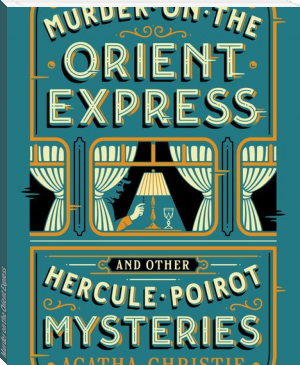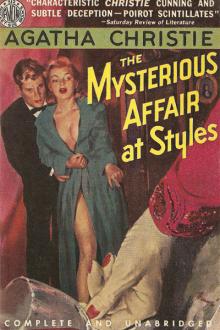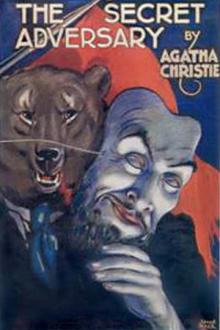Murder on the Orient Express - Agatha Christie (always you kirsty moseley .TXT) 📗

- Author: Agatha Christie
Book online «Murder on the Orient Express - Agatha Christie (always you kirsty moseley .TXT) 📗». Author Agatha Christie
you, gentlemen, that that young sister of Mrs Armstrong's, little more than a child at the time of the tragedy, was Helena Goldenberg, the younger daughter of Linda Arden, and that she married Count Andrenyi when he was an attachй in Washington."
"But Princess Dragomiroff says that the girl married an Englishman."
"Whose name she cannot remember! I ask you, my friends, is that really likely? Princess Dragomiroff loved Linda Arden as great ladies do love great artists. She was godmother to one of the actress's daughters. Would she forget so quickly the married name of the other daughter? It is not likely. No, I think we can safely say that Princess Dragomiroff was lying. She knew Helena was on the train, she had seen her. She realised at once, as soon as she heard who Ratchett really was, that Helena would be suspected. And so, when we question her as to the sister, she promptly lies - is vague, cannot remember, but 'thinks Helena married an Englishman' - a suggestion as far away from the truth as possible."
One of the restaurant attendants came through the door at the end and approached them. He addressed M. Bouc.
"The dinner, Monsieur, shall I serve it? It is ready some little time."
M. Bouc looked at Poirot. The latter nodded. "By all means, let dinner be served."
The attendant vanished through the doors at the other end. His bell could be heard ringing and his voice upraised:
"Premier service. Le dоner est servi. Premier dоner - First service."
Chapter 4
THE GREASE SPOT ON A HUNGARIAN PASSPORT
Poirot shared a table with M. Bouc and the doctor.
The company assembled in the restaurant car was a very subdued one. They spoke little. Even the loquacious Mrs Hubbard was unnaturally quiet. She murmured as she sat:
"I don't feel as though I had the heart to eat anything," and then partook of everything offered her, encouraged by the Swedish lady who seemed to regard her as a special charge.
Before the meal was served, Poirot had caught the chief attendant by the sleeve and murmured something to him. Constantine made a pretty good guess as to what the instructions had been when he noticed that the Count and Countess Andrenyi were always served last and that at the end of the meal there was a delay in making out their bill. It therefore came about that the Count and Countess were the last left in the restaurant car.
When they rose at length and moved in the direction of the door, Poirot sprang up and followed them.
"Pardon, Madame, you have dropped your handkerchief."
He was holding out to her the tiny monogrammed square.
She took it, glanced at it, then handed it back to him. "You are mistaken, Monsieur, that is not my handkerchief."
"Not your handkerchief? Are you sure?"
"Perfectly sure, Monsieur."
"And yet, Madame, it has your initial - the initial H."
The Count made a sudden movement. Poirot ignored him. His eyes were fixed on the Countess's face.
Looking steadily at him she replied:
"I do not understand, Monsieur. My initials are E. A."
"I think not. Your name is Helena - not Elena. Helena Goldenberg, the younger daughter of Linda Arden - Helena Goldenberg, the sister of Mrs Armstrong."
There was a dead silence for a minute or two. Both the Count and the Countess had gone deadly white.
Poirot said in a gentler tone: "It is of no use denying. That is the truth, is it not?"
The Count burst out furiously, "I demand, Monsieur, by what right you -"
She interrupted him, putting up a small hand towards his mouth.
"No, Rudolph. Let me speak. It is useless to deny what this gentleman says. We had better sit down and talk the matter out."
Her voice had changed. It still had the southern richness of tone, but it had become suddenly more clear cut and incisive. It was, for the first time, a definitely American voice.
The Count was silenced. He obeyed the gesture of her hand and they both sat down opposite Poirot.
"Your statement, Monsieur, is quite true," said the Countess. "I am Helena Goldenberg, the younger sister of Mrs Armstrong."
"You did not acquaint me with that fact this morning, Madame la Comtesse."
"No."
"In fact, all that your husband and you told me was a tissue of lies."
"Monsieur!" cried the Count angrily.
"Do not be angry, Rudolph. M. Poirot puts the fact rather brutally, but what he says is undeniable."
"I am glad you admit the fact so freely, Madame. Will you now tell me your reasons for that, and also for altering your Christian name on your passport?"
"That was my doing entirely," put in the Count.
Helena said quietly: "Surely, M. Poirot, you can guess my reason - our reason. This man who was killed is the man who murdered my baby niece, who killed my sister, who broke my brother-in-law's heart. Three of the people I loved best and who made up my home - my world!"
Her voice rang out passionately. She was a true daughter of that mother the emotional force of whose acting had moved huge audiences to tears.
She went on more quietly.
"Of all the people on the train I alone had probably the best motive for killing him."
"And you did not kill him, Madame?"
"I swear to you, M. Poirot - and my husband knows - and will swear also - that much as I may have been tempted to do so, I never lifted a hand against that man."
"I, too, gentlemen." said the Count. "I give you my word of honour that last night Helena never left her compartment. She took a
sleeping draught exactly as I said. She is utterly and entirely innocent."
Poirot looked from one to the other of them.
"On my word of honour," repeated the Count.
Poirot shook his head slightly.
"And yet you took it upon yourself to alter the name in the passport?"
"Monsieur Poirot," the Count said earnestly and passionately, "consider my position. Do you think I could stand the thought of my wife dragged through a sordid police case? She was innocent, I knew it, but what she said was true - because of her connection with the Armstrong family she would have been immediately suspected. She would have been questioned - arrested, perhaps. Since some evil chance had taken us on the same train as this man Ratchett, there was, I felt sure, but one thing for it. I admit, Monsieur, that I lied to you - all, that is, save in one thing. My wife never left her compartment last night."
He spoke with an earnestness that it was hard to gainsay.
"I do not say that I disbelieve you, Monsieur," said Poirot slowly. "Your family is, I know, a proud and ancient one. It would be bitter indeed for you to have your wife dragged into an unpleasant police case. With that I can sympathise. But how then do you explain the
presence of your wife's handkerchief actually in the dead man's compartment?"
"That handkerchief is not mine, Monsieur," said the Countess.
"In spite of the initial H?"
"In spite of the initial. I have handkerchiefs not unlike that, but not one that is exactly of that pattern. I know, of course, that I cannot hope to make you believe me, but I assure you that it is so. That handkerchief is not mine."
"It may have been placed there by someone in order to incriminate you?"
She smiled a little. "You are enticing me to admit that, after all, it is mine? But indeed, M. Poirot, it isn't." She spoke with great earnestness.
"Then why, if the handkerchief was not yours, did you alter the name in the passport?"
The Count answered this.
"Because we heard that a handkerchief had been found with the initial H on it. We talked the matter over together before we came to be interviewed. I pointed out to Helena that if it were seen that her Christian name began with an H she would immediately be subjected to much more rigorous questioning. And the thing was so simple - to alter Helena to Elena, was easily done."
"You have, M. le Comte, the makings of a very fine criminal," remarked Poirot dryly. "A great natural ingenuity, and an apparently remorseless determination to mislead justice."
"Oh, no, no." The girl leaned forward. "M. Poirot, he's explained to you how it was." She broke from French into English. "I was scared - absolutely dead scared, you understand. It had been so awful - that time - and to have it all raked up again. And to be suspected and perhaps thrown into prison. I was just scared stiff, M. Poirot. Can't you understand at all?"
Her voice was lovely - deep - rich - pleading, the voice of the daughter of Linda Arden the actress.
Poirot looked gravely at her.
"If I am to believe you, Madame - and I do not say that I will not believe you - then you must help me."
"Help you?"
"Yes. The reason for the murder lies in the past - in that tragedy which broke up your home and saddened your young life. Take me back into the past, Mademoiselle, that I may find there the link that explains the whole thing."
"What can there be to tell you? They are all dead." She repeated mournfully: "All dead - all dead - Robert, Sonia - darling, darling
Daisy. She was so sweet - so happy - she had such lovely curls. We were all just crazy about her."
"There was another victim, Madame. An indirect victim, you might say."
"Poor Susanne? Yes, I had forgotten about her. The police questioned her. They were convinced that she had something to do with it. Perhaps she had - but if so only innocently. She had, I believe, chatted idly with someone, giving information as to the time of Daisy's outings. The poor thing got terribly wrought up - she thought she was being held responsible." She shuddered. "She threw herself out of the window. Oh! it was horrible."
She buried her face in her hands.
"What nationality was she, Madame?"
"She was French."
"What was her last name?"
"It's absurd, but I can't remember - we all called her Susanne. A pretty, laughing girl. She was devoted to Daisy."
"She was the nursery-maid, was she not?"
"Yes."
"Who was the nurse?"
"She was a trained hospital nurse. Stengelberg her name was. She too was devoted to Daisy - and to my sister."
"Now, Madame, I want you to think carefully before you answer this question. Have you, since you were on this train, seen anyone that you recognised?"
She





Comments (0)